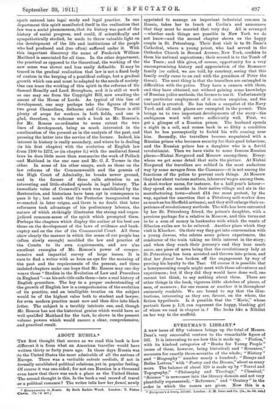ABOUT RUSSIA.*
*TRH first thought that occurs as we read this book is how different it is from what an American traveller would have written thirty or forty years ago. In those days Russia was Ito the United States the most admirable of all the nations of Europe. There was a veritable entente cordiale, if not• in ,formally established political relations, yet in popular feeling. -Of course it was one-sided; for not one Russian in a thousand .even knew that there was such a place as the United States. 'The second thought is this, Is the book a real record of travel or a political romance P The writer tells how her fiance, newly • Honeymooning in Russia. By Ruth Redzie Wood. London : T. Fisher %Litwin. 17s. t d net.J appointed to manage an important industrial concern in Russia, takes her to lunch at Carlin's and announces that they must be married that very day. All is arranged —whether such things are possible in New York we do not know—and the second chapter shows us the happy couple in St. Petersburg. Their first visit is to St. rsaac's Cathedral, where a young priest, who had served in the Orthodox Church in Second Avenue, New York, confides to them his national aspirations ; their second is to the Tomb of the Tsars ; and this gives, of course, opportunity for a very uncompromising history and appreciation of the Romancer family (so called, we are told, by courtesy, seeing that this family really came to an end with the grandson of Peter the Great). The next thing is that the travellers are entangled in difficulties with the police. They have a camera with them, and they have obtained, not without gaining some knowledge of Russian police methods, the licence to use it. Unfortunately one particular employment of it excites suspicion, and the husband is arrested. He has taken a snapshot of the Navy Yard, and all such places are exempted in the permit. This brings us to two important developments of the story—the ambiguous word will serve sufficiently well. First, we get a glimpse of a Russian prison. The husband spends a night in a cell, and comes back in so filthy a condition that be has peremptorily to forbid his wife coming near him. Secondly, the travellers become acquainted with a Russian prince who becomes security for their good behaviour, and the Russian prince has a daughter who is a fervid revolutionist. Then we have visits to some famous Russian places—Nizhni Novgorod and Moscow among them. Every- where we get some detail that suits the picture. At Nizhni Novgorod the travellers are robbed in the most audacious way by some savages from the Caueasus—it is not among the functions of the police to prevent such things. At Moscow they hear about various matters, labourers'wages among them. A steel-worker earns, for instance, for a half-year's labour— they spend six months in their native village and six in the manufacturing town—about £14 (we must protest, by the way, against the assertion that a Pittsburg mill-worker does as much as ten Sheffield artisans), and they still enlarge their ex- perience of revolutionary methods. The wife has been entrusted by her St. Petersburg friend, the prince's daughter, with a precious package for a relative in Moscow, and this turns out to be a sum of money in banknotes with which the wants of Siberian exiles are to be relieved. Another place which they visit is Kharkov. On their way they get into conversation with a young. Jewess, who relates some prison experiences, the conductor of the train taking no little interest in the story; and when they reach their journey's end they hear much more, one piece of news being that the revolutionary lady at St. Petersburg has been arrested and thrown into prison, and that her fiancé has broken off the engagement by way of proving his loyalty to the Tsar. Of course it is possible that a honeymooning couple might meet with these adventures and experiences ; but if they did they would have done well, one cannot but think, to say nothing about them. There are other things in the book, vigorous little sketches of places, of men, of manners ; for one reason or another it is throughout eminently readable. We are bound to say that the illus- trations, interesting as they are. favour, on the whole, the fiction hypothesis. Is it possible that the " Marie," whose portrait faces p. 1:0, can represent the happy, blushing girl of whom we read in chapter ix. ? She looks like a Nihilist on her way to the scaffold.










































 Previous page
Previous page